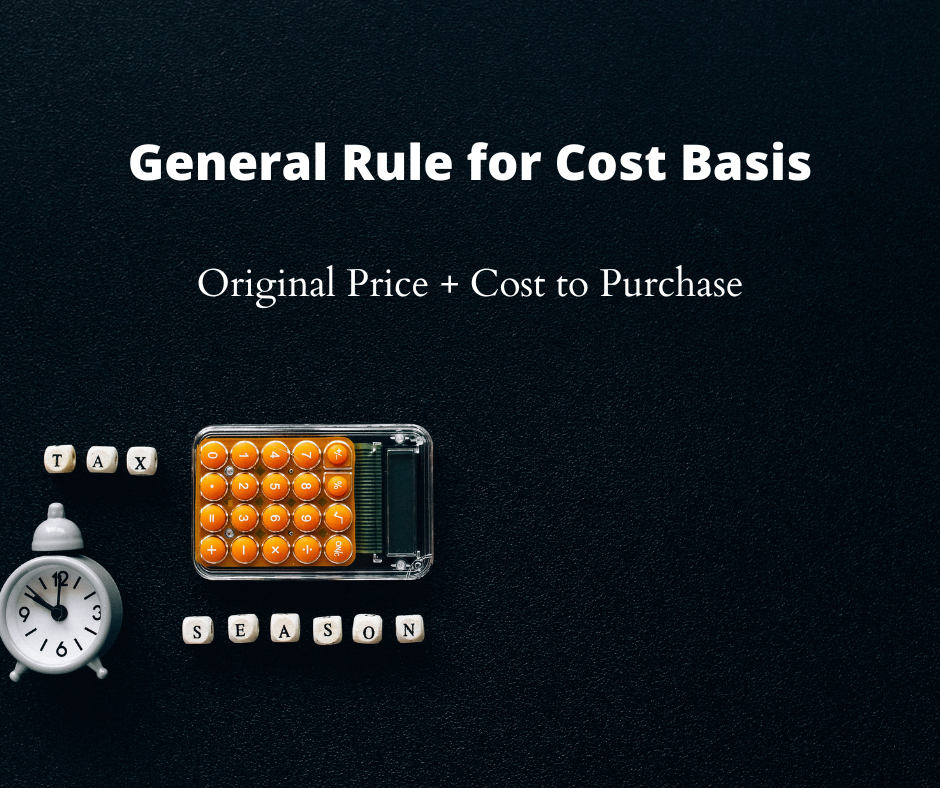Taxation involves complexity. It’s completely normal to think this way.
To file a single tax return, you will have to go through these stages: understanding the IRS regulations, learning heavy jargon, and interpreting your financial status.
Under this big umbrella, Cost Basis is one the most talked-about concept in the taxation processes.
What is the cost basis, how does it relate to our taxes, and how should we file them? We have answered everything in this article.
Moreover, if your curious mind wants something more to understand, we have left a link at the end where you can ask anything related to taxation.
What is the Cost Basis?

Cost basis is the original price of an asset plus anything fee involved while purchasing or maintaining that asset.
Let’s understand this with a basic example. You decide to buy a house worth $100,000. While buying the house, you paid a $5,000 commission to the property dealer.
During the holding period of your property, you spend $2,000 on maintenance.
To calculate the cost basis, we will use the following equation:
= Original Price ($100,000) + Commission ($5,000) + Maintenance ($2,000)
= Cost Basis ($107,000)
Types of Cost Basis
The cost basis is not limited to property, but it also includes other investments as well.
We have mentioned some of its types by using an example for each.
Cost Basis on Buying Stocks
If you buy any stock, the cost basis will be the original price plus the commission involved while buying the stock.
Example
Tesla stock has a market value of $10 per share. You buy 10 shares of Tesla for $100. Moreover, you pay a $10 commission to buy the stocks.
You will calculate your cost basis by adding the market value of your shares ($100) plus any commission involved ($10) while buying it.
The cost basis will be $110 with an $11 per share.
Cost Basis on Mutual Funds
If you invest in mutual funds, the cost basis will be the value of a net asset (NAV) plus any fee (loads) involved while making a purchase.
The concept is similar to buying stocks and calculating a cost basis on them. However, the terms are different here.
Example
You invest in mutual funds. You buy 10 shares for $100 (NAV) and with a 10% load. The 10% load will count as commission.
The total cost basis in this scenario will be $110 (NAV + Commission) with an $11 cost basis per share.
Cost Basis on Stock Splits
The cost basis for the stock split will be divided by the split ratio.
Example
You have 1000 shares of Tesla with a cost basis of $10 each share. If the company divides each share between the two, you will have 2000 shares of Tesla.
Your cost basis will be dived by 2 as well. This will make your cost basis $5 per share.
Different investments need a different methodology to calculate the cost basis. However, the general rule remains the same: original price + commission.
How Does Cost Basis Affect your Taxes?
The IRS regulation implements different taxes on your capital gains (profits).
For example, if you buy a property for $100,000 and sell it for $200,000, you will be taxed on the gains you make during the holding period.
However, the taxation process asks to include the cost basis as well.
In the previous example, if you pay a $5,000 commission while buying the property and $10,000 while selling the property, your buying price will be $105,000, and your selling price will be $210,000.
To calculate your capital gains, you will subtract the final price from the initial price ($210,000 – $105,000). In this case, it will be $105,000. This is your taxable amount.
Moreover, if you spend some extra amount while maintaining the house, you can subtract it from your capital gains.
For example, if you spend 15,000 on your maintenance, your taxable amount will be reduced to $90,000 from $105,000.
Five Tips While Calculating Cost Basis
Even if the general rule remains the same, we have gathered some of the important points to note while calculating your cost basis accurately.
- In addition to the original price, calculate all the expenses you make while purchasing the property or while making an investment.
- It’s advisable to calculate the cost basis of each share.
- You should consider reporting your payouts.
- Calculate the expenses while maintaining the property.
- Calculate anything that can affect the original price of your asset.
How to Report Your Cost Basis in Taxation?
To report your cost basis, the IRS asks you to file Form 8949. However, it’s always advisable to take a legal consultation before filing any of your taxes.
A CPA spends years understanding the taxation challenges and knows how to avoid unnecessary taxes. Since cost basis is something that can reduce your taxes, we would strongly advise taking help before calculating and reporting it on your tax returns.
Moreover, if you are confused about anything related to taxation, ask a question today, we are here to help.
